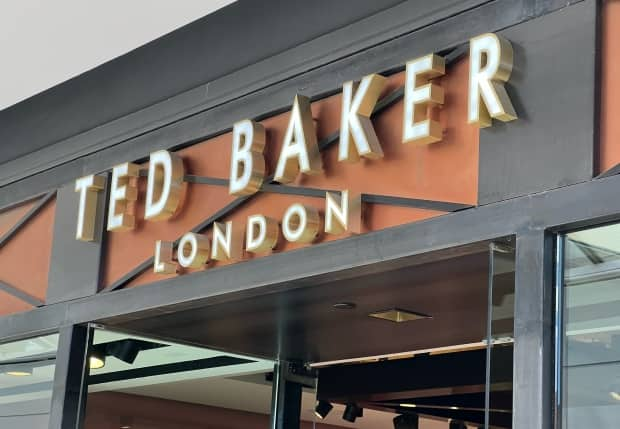Luxury retailer Ted Baker begins store-closing liquidation sales

Clothing retailers Ted Baker, Brooks Brothers and Lucky Brand have started store-closing clearance sales, Ted Baker Canada announced Friday after the company began insolvency hearings late last month.
The three banners, which are owned by the New York-based Authentic Brands Group (ABG), represent 25 stores in Canada.
Matthew Butler, a spokesperson representing Ted Baker Canada, confirmed to The Canadian Press that the sales would encompass Ted Baker's entire Canadian and U.S. footprint, but only Brooks Brothers and Lucky Brand's Canadian locations.
ABG did not immediately reply to CBC's request for comment. It's not clear how many of the stores, if any, will remain open. The number of staff affected is unknown.
Ted Baker Canada said in a news release that nine of its stores in Canada and all 31 in the U.S. (where the banner is Ted Baker Limited) would be offering sales on their entire collections.
Online shopping shut down
All eight Brooks Brothers Canada stores and all seven Lucky Brand Canada stores will have closing sales as well.
All sales are now final, and the company said online shopping is no longer available "for the time being."
Late last month the owners of Ted Baker's Canadian operations filed for creditor protection in a bid to help the retailer get enough "breathing room" to decide whether to liquidate and wind down the business or pursue other unspecified alternatives.
In court filings on April 24, lawyers for the ownership group said the clothing brand was facing "significant" liquidity challenges and had been "unsuccessful" in reducing costs, improving sales and reaching positive cash flow in Canada.
'Substantial disruptions' due to missed payments
Ownership group OSL Fashion Canada and OSL Fashion Services bought an equity interest in Ted Baker's Canadian and U.S. operations in March 2023 from Authentic Brands Group (ABG)'s No Ordinary Design Label (NODL) subsidiary.
The Ted Baker Canada owners have licensing agreements with NODL, which has had recent insolvency proceedings in the U.K., and ABG, whose partners pay suppliers in the Ted Baker supply chain, but the Ted Baker Canada owners said some of those payments had not been made, causing "substantial disruptions."
Liza Amlani, principal and co-founder of the Retail Strategy Group in Toronto, said the pending closures were not surprising to analysts. She said any problems between AGB and its suppliers is not the full story, given the large portfolio of brands AGB looks after.
The real issues more likely involve the product mix at the store and a lack of understanding of the Canadian market, she said.
"Every province you go in is very different," she said. "Customers are different, they're spending differently, they are dressing differently. So when I see brands coming into Canada without having that investment on the ground, that's where we start to see this sort of unravel."
Amlani said Ted Baker did a good job of sorting its product mix, adding dresses, casual wear and athleisure wear, but "brands don't realize that what folks want in B.C. is very different to what customers want in Ontario."
'They think we're just an extension of the U.S.'
Ted Baker and Brooks Brothers also didn't make it clear they had diversified the product in their stores, she said.
"They didn't market themselves differently," she said. "So they weren't getting that footfall of customers coming in looking for more casual even though they were offering that."
Lucky Brand, meanwhile, was more discount-driven and had difficulty being seen as a place to shop for full-cost product.

"Just like what happened with Nordstrom, that these bigger groups, these retailers, these brands coming into Canada, they think we're just an extension of the U.S., which is absolutely not true."
For a company like ABG, which owns dozens of brands including Sports Illustrated, Quiksilver and Eddie Bauer, the company sees brands like these as low-hanging fruit, she said.
"They're buying these brands because they can get them for cheap, not necessarily because they're using them to make a profit," she said. "I don't think that they're seeing this as a long-term investment. They're taking the intellectual property, the customer data. Data is worth so much more sometimes than the actual product that's selling on discount at these stores."


